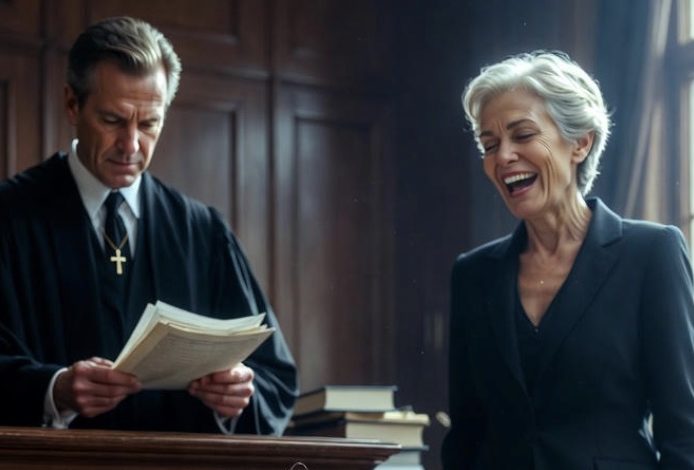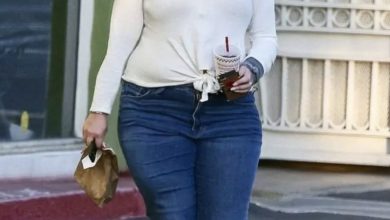A Woman’s Loyalty Is Tested When a Secret Codicil Changes Everything

At my FIL’s will reading—the man I had looked after with full dedication for years—the attorney declared that I wouldn’t get a single cent. My husband and MIL exchanged small delighted smiles. “So much for everything you did,” they whispered with spite. I didn’t argue. I set my FIL’s old pocket watch on the table. “Mr. Lawyer,” I said quietly, “would you like to explain why this watch…”
1. The Caretaker
The reading of the will didn’t feel like a gentle farewell to a man who had lived a long life. Instead, it felt like I had walked into a high-pressure business meeting where people were ready to fight for whatever they could take. I sat stiffly in a tall leather chair in the dim, wood-paneled office of Harrison, Finch, and Associates. The heavy scent of lemon polish, dust, and aging paperwork filled the room. In the corner, a grandfather clock ticked loudly, almost as if it were counting down to the moment everything familiar in my life would change.
My presence today was the result of three full years spent caring for my father-in-law, William Sterling. For 1,095 days—days and nights combined—I was the only one looking after him. I handled his medications, the doctors’ visits, the endless cleaning, the constant confusion, and the heartbreaking changes caused by his dementia. I watched him fade, piece by piece, yet I stayed because I loved him and because he had always treated me with kindness and respect.
Across from me sat my husband, Thomas, and his mother, Brenda. They were dressed in dark, expensive clothing, but their faces carried no grief. There was no sadness, no ache, no sign of loss. Instead, they wore a kind of eager anticipation, like people waiting for their names to be called as winners of a prize.
Their visits during William’s long decline had been quick and carefully planned. They always managed to arrive when he was having one of his better moments. The moments when he was confused, crying, or in pain? Somehow, they were always “too busy” for those.
“Oh, is the doctor having trouble keeping him calm today?” Brenda would ask on the phone, her voice full of fake sympathy. “You should let him rest. We’ll visit when he’s feeling clearer.”
But those promised visits rarely ever took place. Everything—the mess, the physical effort, the emotional exhaustion—fell onto me. I had put my career on hold, stepping back from a major promotion in my design job. I told my biggest client that I needed a “temporary break,” but that break stretched into years. It wasn’t something I did because I had to; I did it because William Sterling had always valued me and seen me as more than just his son’s wife. He believed in my work. He asked about my projects. He saw something good in me.
And now, he was gone.
2. The Verdict
The lawyer, Mr. Harrison—a round man with a tired, gentle face—cleared his throat and began reading the terms of William’s will. The papers rustled as he lifted them, and the sound felt strangely loud in the quiet office.
He started reading the sections that mattered most. All the property—including the beautiful Tudor-style family home I had spent years maintaining. All the controlling shares in Sterling Holdings, the successful company William had built through decades of work. All bank accounts, trusts, investments—everything of value would go to Thomas and Brenda.
My name wasn’t anywhere.
Not even once.
Brenda let out a sharp, triumphant laugh, like the cracking of glass. She looked directly at me, her eyes gleaming with satisfaction.
“So much for everything you did,” she said, her tone dripping with spite. “All those months of feeding him, bathing him, cleaning up after him. Did you actually think your… little acts… earned you a piece of the Sterling fortune?”
Thomas looked at me next. I thought for a small moment he might finally defend me, or at least show some humanity. But he dropped his gaze to the floor, unable to look at me. It was the final push I needed to understand what had really happened.
He knew.
He had known all along.
He had allowed me to give up everything so his hands would remain clean and his conscience untouched.
I felt like the air had been punched out of my lungs. But I kept my posture straight. I would not cry in front of them. I refused to let them twist my pain into proof that I was only there for money.
Instead, I reached into my coat and pulled out the one thing William had asked me again and again to keep safe—his antique gold pocket watch. I placed it on the center of the table. The simple act made the room go silent.
I turned to the lawyer, ignoring the two faces staring at me with a mix of shock and growing fear.
“Mr. Harrison,” I said softly, “would you explain why William told me to bring this watch to you today? And only after the main will was read?”
3. The Hidden Clue
Something changed in Mr. Harrison’s expression instantly. The polite sadness dropped. In its place came shock, confusion, and something like alarm. He leaned forward, examining the watch with a seriousness I had never seen before.
He lifted it carefully, turning it over in his hands until he found a tiny indentation on the side. It was barely visible. He pressed it gently.
With a quiet click, the back of the watch opened.
Inside was a small metal plate. On it were three things:
A date.
A time.
And a long alphanumeric code.
Mr. Harrison looked up at me, his face pale.
“Mrs. Miller… this watch is the key to William Sterling’s private digital safe deposit box. The bank’s instructions were extremely strict. The box could be opened only after the main will was read, and only if this watch was physically presented by a family member.”
Brenda gasped loudly. “What? That’s impossible! She must have stolen it!”
Thomas stared at the watch as if seeing it for the first time in his life.
I didn’t respond to either of them. I kept my eyes on the lawyer.
Mr. Harrison understood the message in my silence. He turned and walked to a secure computer on his desk. He typed the code from the watch into a password field. After verifying a confirmation message on his phone, a new file appeared on his screen.
He printed it and turned to face us.
4. The Revelation
The document was titled:
“The Final Codicil: Statement of True Intent.”
It had been signed and notarized six days before William’s death.
Mr. Harrison began reading William’s final words.
William explained, in painful detail, how Thomas and Brenda had avoided him. How they only showed up when they felt obligated. How Thomas had refused to come to the hospital the day William collapsed—because he was preparing for a golf tournament.
He wrote about how Brenda had said she preferred to “remember him as he used to be,” instead of seeing him sick.
He wrote about how the only person who had been beside him, day after day, without fail, was me—Anna Miller.
He wrote:
“You were the only one who stayed. You treated me not as a problem to be managed, but as family. You comforted me, protected me, and cared for me with dignity. Because of your loyalty and kindness, I leave my entire estate to you.”
Thomas and Brenda both froze. All color drained from their faces.
Brenda began shouting that the document must be fake. Thomas looked like a man watching his entire life collapse.
But Mr. Harrison continued reading, finishing with the legal confirmation that the previous will was completely void.
Everything—homes, company shares, money, assets—belonged to me.
Anna Miller.
5. The Final Vow
Brenda screamed that she would challenge everything in court. Thomas begged me to talk things over. But their words no longer mattered.
I stood slowly. I looked at Thomas—really looked at him—and felt nothing but a cold, quiet disappointment. I had lost my marriage long before this moment. I just hadn’t realized it.
I took the watch back from the table and held it gently.
Then I told Mr. Harrison to calculate every penny I had spent, every salary I had lost, everything my years of labor were worth.
Thomas and Brenda had taken three years from my life.
They could repay at least that much.
6. The True Legacy
I didn’t move into the Sterling mansion. I walked through it one last time, touched William’s photograph, and thanked him for trusting me.
Then I sold the house.
I sold part of the company shares.
And with that money, I created something new—something meaningful:
The Sterling Legacy Trust for Elder Care.
A foundation that would help elderly people who had been forgotten by their families, providing care, companionship, and financial support—everything William deserved and so often lacked.
I designed the logo myself:
An hourglass held gently between two hands.
It was the perfect symbol.
I had lost a husband who didn’t love me.
I had lost a family that never accepted me.
But I had gained something far more important:
A purpose.
A legacy.
A life that finally belonged to me.
And William Sterling’s watch—now returned to its box—had opened that door.










